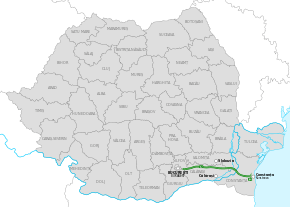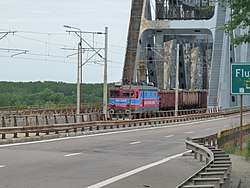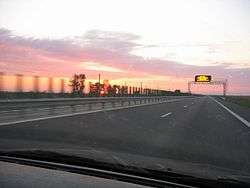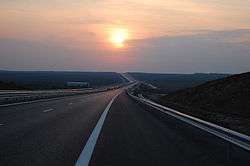A2 motorway (Romania)
| ||||
|---|---|---|---|---|
| Autostrada A2 | ||||
 | ||||
| Route information | ||||
| Maintained by Compania Națională de Administrare a Infrastructurii Rutiere | ||||
| Length | 206 km[1][2] (128 mi) | |||
| Existed | 1987 – present | |||
| Major junctions | ||||
| West end | Bucharest (exits to CB) | |||
| A0 (planned) | ||||
| East end | Constanța (merges into A4) | |||
| Location | ||||
| Counties | Ilfov, Călărași, Ialomița, Constanța | |||
| Major cities | Fetești, Cernavodă, Medgidia | |||
| Highway system | ||||
| ||||





The A2 motorway (Romanian: Autostrada A2), also known as The Sun's Motorway (Romanian: Autostrada Soarelui), is a motorway in Romania which links Bucharest with Constanța, a city-port on the shore of the Black Sea, where it merges after an interchange into the A4 motorway.[3] It is 206 km long,[1][2] and has been operational on its entire length since November 2012.
History
The construction of the motorway between Bucharest and Constanța began in the communist era during Nicolae Ceaușescu's regime. The first section, from Fetești to Cernavodă (about 18 km), was opened in 1987 and underwent a major rehabilitation in 2003. It crosses the Balta Ialomiței island and includes the Cernavodă Bridge complex system of motorway and railway bridges and viaducts over the Danube and one of its branches at Cernavodă. The motorway bridge passes under the historical railway bridge built by Anghel Saligny in 1896, while the new railway in use today separates the motorway roadways.
After the fall of the communism in 1989, construction continued for a short period, but it was finally stopped in 1993 due to lack of financial resources. Construction continued after 1998, the motorway being completed in late 2012.
The sector from Bucharest to Fetești crosses the Bărăgan Plain and was built between 2001 and 2007. It was split into four sections. The first section from Bucharest to Fundulea (26.5 km) was built by the Romanian company Romis and is surfaced with concrete slabs. The second section from Fundulea to Lehliu (29.2 km) was built by a Turkish joint venture between Yuksel, Makimsar and Ener, while the third section from Lehliu to Drajna (41.6 km) was built by the French company Colas. The three sections were completed in 2004.[4] The fourth, from Drajna to Fetești (36.8 km), was built by a joint venture between Astaldi, Max Bögl and CCCF, and was completed in 2007, receiving financial support from the ISPA funds.[5]
The sector from Cernavodă to Constanța (51.3 km) runs across the Dobrogea Plateau and was built between 2009 and 2012, receiving financial resources from the European Union's Cohesion Fund and from the European Investment Bank. It was built by a joint venture between Astaldi and Max Bögl, and was completed in late 2012.[6] The section from Cernavodă to Medgidia was initially awarded to the French company Colas, but the contract was terminated in April 2011, because of delays in the construction process.[7] It was subsequently awarded to the new constructor in September 2011.[8]
The total distance between Bucharest and Constanța on the motorway is approximately 206 km.[1][2] It includes a 3.8 km link segment at the eastern end,[9][10] that was part of the construction contract for the A4 motorway,[11] which serves as the Constanța bypass. It has seven exits and ten rest areas on each carriageway, five being served by filling stations. There is one toll gate along the route, at Fetești (km 144), where a tax is charged for crossing the Danube bridges.[12][13]
During summer, heavy traffic (maximum permissible weight over 7.5 t) is forbidden to drive on the motorway on weekends (including Friday) at daylight hours (from 6 A.M. to 12 A.M.).[14]
It is planned that the motorway will be prolonged to the Bulgarian border, after the European Union accepted in November 2010 to include the segment from Constanța to Vama Veche into the planned Trans-European Network.[15][16]
Openings timeline
- In October 1987, the 17.2 km segment Fetești – Cernavodă was opened for traffic. The segment was closed for traffic again in September 2006 for complete rebuilding and reopened in 2007.
- On 4 June 2004, two segments opened for traffic: Bucharest – Fundulea (26.5 km) and Fundulea – Lehliu (29.2 km).
- In November 2004, the 42 km segment Lehliu – Drajna was opened for traffic.
- In June 2006, the 17.2 km segment Fetești – Cernavodă was re-opened for traffic, after major rehabilitation works.
- Between 1 July and 15 September 2006, the 36.8 km segment Drajna – Fetești temporarily opened for traffic in both ways but only on one carriageway.
- On 1 May 2007, the 36.8 km segment Drajna – Fetești was re-opened for traffic.
- On 29 July 2011, the Murfatlar – Constanța segment (21 km, including a part of A4) was inaugurated (initially, on two of the total four lanes).[17]
- On 30 September 2011, the Murfatlar – Constanța segment was completed and opened on both carriageways.[18]
- On 19 July 2012, the Cernavodă – Medgidia segment (20.5 km) was opened for traffic on a single carriageway, and the Medgidia – Murfatlar segment (16.3 km) was opened on both carriageways.[19]
- On 29 November 2012, the Cernavodă – Medgidia segment (20.5 km) was opened for traffic on both carriageways.[20]
Exit list
| Exits and buildings (Eastbound) | ||||
| Bucharest – Constanța (206 km) | ||||
| km 11 | Theodor Pallady Blvd, Bucharest | |||
| km 12 | Bucharest Ring Road | opened 2004 | ||
| km 18 | Cernica / Bălăceanca | opened 2015 | ||
| km 35 | Fundulea | opened 2004 | ||
| km 48 | OMV | |||
| km 64 | Lehliu Gară | opened 2004 | ||
| km 66 | Petrom | |||
| km 74 | Parking | |||
| km 88 | Litro | |||
| km 98 | Parking | |||
| km 105 | Drajna / Slobozia, Călărași | opened 2007 | ||
| km 111 | OMV | |||
| km 120 | Parking | |||
| km 131 | Parking | |||
| km 139 | Litro | |||
| km 142 | Fetești | opened 1987, rebuilt 2007 | ||
| km 144 | Toll gate | opened 1987 | ||
| km 145 | Fetești Bridge (over Borcea branch of the Danube) | opened 1987 | ||
| km 146 | U-turn exit | |||
| km 157 | U-turn exit | eastbound only | ||
| km 158 | Cernavodă Bridge (over Danube) | opened 1987 | ||
| km 160 | Cernavodă | opened 1987, rebuilt 2012 as exit | ||
| km 192 | Medgidia / Murfatlar, Ostrov | opened 2012 | ||
| km 196 | Parking | opened 2012 | ||
| km 203 | Danube–Black Sea Canal | opened 2011 | ||
| km 205 | Parking | opened 2012 | ||
| km 212 | Mangalia, Constanța South / Tulcea, Constanța West | opened 2011 | ||
See also
References
- 1 2 3 "Licitatie deschisa servicii pentru asigurarea pazei patrimoniului Autostrazii A2 Bucuresti - Cernavoda" (PDF). CNADNR. 13 September 2007. Archived from the original (PDF) on 5 March 2016.
Bucuresti – Cernavoda: km 9+500 – km 160+980
- 1 2 3 "Asigurare paza patrimoniu prin patrulare si posturi fixe pe autostrada A2 Cernavoda - Constanta" (PDF). CNADNR. 28 December 2012. Archived from the original (PDF) on 2016-03-04. Retrieved 2013-07-23.
Cernavoda – Constanta: km 160+980 – km 215+950
- ↑ "Descriere proiect". Proiectarea şi Construcţia Autostrăzii Cernavodă – Medgidia. Archived from the original on 12 August 2013. Retrieved 15 July 2012.
- ↑ "Constructie autostrazi - Coridorul IV Nădlac - Constanţa - Autostrada Bucureşti - Constanţa". CNADNR. Archived from the original on 13 March 2013. Retrieved 18 June 2013.
- ↑ "Construcţia şi reabilitarea secţiunilor 4 şi 5 din autostrada Bucureşti-Constanţa". CNADNR. Archived from the original on 15 August 2013. Retrieved 18 June 2013.
- ↑ "Constructia autostrazii Cernavoda – Constanta". CNADNR. Archived from the original on 22 August 2013. Retrieved 18 June 2013.
- ↑ Claudia Pîrvoiu (11 April 2011). "CNADNR a lăsat tronsonul de autostradă Cernavodă-Medgidia fără constructor". Hotnews.ro (in Romanian). Archived from the original on 12 April 2011. Retrieved 14 April 2018.
- ↑ Claudia Pîrvoiu (21 September 2011). "CNADNR a semnat cu Astaldi contractul pentru realizarea tronsonului Cernavodă- Medgidia". Hotnews.ro (in Romanian). Archived from the original on 24 September 2011. Retrieved 14 April 2018.
- ↑ "Notă de fundamentare" (PDF). CNADNR. 10 July 2012.
- ↑ "Notă de fundamentare" (PDF). CNADNR. 29 May 2013.
- ↑ "Incadrare in zona a obiectivului". Constructia variantei de ocolire a Municipiului Constanta. Archived from the original on 13 May 2010. Retrieved 23 July 2013.
- ↑ "Benzinarii Autostrada A2 (Soarelui)". Gazonline.ro. Retrieved 15 July 2012.
- ↑ "Autostradă A2 - Autostradă Soarelui". Motorways-exitlists.com. 10 October 2011.
- ↑ "Driving restrictions Romania 2012". UNTRR.ro. 11 January 2012. Archived from the original on 2012-04-29.
- ↑ Doru Cireașă (29 November 2010). "Autostrada București-Constanța, prelungită până la Varna?". România Liberă (in Romanian). Archived from the original on 14 April 2018. Retrieved 14 April 2018.
- ↑ I.G. (30 November 2010). "Autostrada București-Constanța, prelungită până la Varna" [Motorway link between Bucharest and Constanța prolonged up to Varna]. Rol.ro (in Romanian). Archived from the original on 3 December 2010. Retrieved 14 April 2018.
- ↑ "Traseul tronsonului din Autostrada Soarelui care ocolește Constanța spre Mangalia". Hotnews.ro (in Romanian). 28 July 2011. Archived from the original on 10 October 2011. Retrieved 14 April 2018.
- ↑ Victor Cozmei (30 September 2011). "Vineri s-a inaugurat pentru a doua oară același tronson din Autostrada Soarelui și s-au dat în folosință încă 4 km din Centura Municipiului Constanța (A4)". Hotnews.ro (in Romanian). Archived from the original on 30 September 2011. Retrieved 14 April 2018.
- ↑ Victor Cozmei (18 July 2012). "Autostrada Soarelui (A2), deschisă în întregime de la București și până la Constanța". Hotnews.ro (in Romanian). Archived from the original on 20 July 2012. Retrieved 14 April 2018.
- ↑ Victor Cozmei (28 November 2012). "Autostrada A2 București-Constanța, finalizată după 25 de ani. Joi s-a deschis traficul pe ambele căi de pe tronsonul Cernavodă - Medgidia". Hotnews.ro (in Romanian). Archived from the original on 1 December 2012. Retrieved 14 April 2018.
External links
| Wikimedia Commons has media related to A2 motorway (Romania). |

